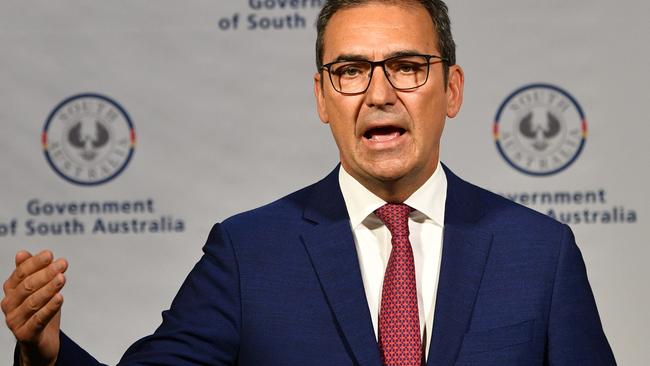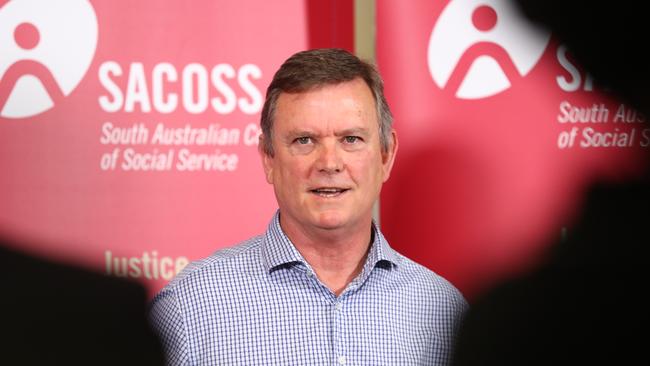South Australia’s economic recovery to find silver lining from dark cloud of COVID-19
Coronavirus has up-ended the Marshall Government’s economic plans for South Australia. But the Premier says he's hopeful he can find a silver lining in this dark cloud.
Coronavirus News
Don't miss out on the headlines from Coronavirus News. Followed categories will be added to My News.
- No new cases, SA joins national repatriation mission
- Are you getting the most from your Advertiser subscription?
South Australia’s economy is poised to rebound faster than other states if we capitalise on the “silver linings to an otherwise very dark cloud”, says Premier Steven Marshall.
Population growth, tourism, international students and hi-tech industries such as space are still in Mr Marshall’s economic blueprint for the state – although now in different ways.
As SA’s number of active COVID-19 cases dropped to double digits yesterday, Mr Marshall outlined to the Sunday Mail how key promises he took to the election – but that are now under strain – could be tackled.
Figures released during the week highlight just how rocky the road ahead could be.
They include a 0.4 per cent growth in the unemployment rate, a $430 million-a-month hit to the local tourism industry and a $2 billion loss of revenue from international students over the next three years.

A key priority to boost population has been made significantly more challenging with the closure of borders as growth was heavily reliant on international migrants.
But Mr Marshall said the realisation that people could be productive working from home could work to SA’s advantage.
“We are looking to create a silver lining to an otherwise very dark cloud,” he said.
“The old model of having to go to work for 12 hours a day in a 60-storey tower in Hong Kong, Singapore, London or Sydney will just not be relevant any more.
“Companies will be looking to tap into expertise all around the world. This will be a great opportunity for us to turn off the brain drain of the last 20 years.”
Australian Industrial Transformation Institute director John Spoehr said that, in time, SA’s handling of COVID-19 would attract skilled migrants.
“People will be looking for the safest places in the world to settle,” Professor Spoehr said.
He has also backed Mr Marshall’s commitment to high-end careers in areas such as space and defence.
“What is not impacted (by COVID-19) is the $90 billion defence spend on shipbuilding – it is one of our great strategic and economic advantages,” he said.
Mr Marshall said he was confident closed borders would prompt locals to spend money in SA rather than hot spots such as Bali and Europe as those destinations will take longer to recover. New figures revealed during the week show SA’s tourism sector is haemorrhaging almost $430 million a month due to the coronavirus.
Mr Marshall said talks were under way to help international students affected by the fallout of the pandemic.
But SA Council of Social Services chief Ross Womersley said he was concerned.
He said a growth in digital teaching could have a negative impact on SA because its competitive cost of living compared to other states and countries would no longer be a factor in choosing a university.

MORE NEWS:
Buy back pokies to get hospitality staff paid
Can government just end school debate for good?
Parents plead for relief from Catholic school fees
“(Some) universities in other parts of the world have much higher levels of standing, so if this does become much more a model of delivery, then people may want to choose to get their qualifications from an Oxford or Harvard-type university,” Mr Womersley said.
Mr Marshall said that, historically, SA had been “a laggard” coming out of an economic downturn, but that “we are absolutely determined to learn the lessons from our past”.
He said national Cabinet briefings had been regularly attended by federal Treasury Department head Steven Kennedy and Reserve Bank governor Dr Philip Lowe
“As a state, we are in a good position because, compared to many other countries in the world, we still have the ability to borrow, and this will enable us to fully fund the health recovery as well as fully fund the economic recovery,” Mr Marshall said. “The focus of our economic recovery is preserving as many jobs through this crisis and having the best economic bounce possible on the other side.”
KEY CHALLENGES
Population: The original plan: To raise the state’s population growth rate of 0.7 per cent to reflect the national rate of 1.6 per cent.
The challenge: In SA about three quarters of population growth comes from international arrivals, with the other quarter coming from natural increase (births over deaths).
More South Australians move to others states than interstaters who decide to call SA home.
Steven Marshall says: “We are hoping that the net interstate migration in SA will significantly reduce during this period. We will position ourselves in the medium-term as a safer more attractive place to live.”
Australian Industrial Transformation Institute director John Spoehr says: “Unfortunately … population growth is going to be severely hampered by the slowdown of international migration to Australia … On the other hand … SA will be seen to have managed the crisis extremely well (and) people will be looking for the safest places in the world to settle.”
Jobs
The original plan: The State Government has put growth in high-end sectors like space, cyber and defence at the centre of their jobs strategy.
The challenge: South Australia leads the nation in unemployment, at 6.2 per cent, and that was before the impact of tens of thousands of locals losing their jobs.
Steven Marshall says: “As a new government we have been focused on global sectors like defence, space cyber, machine learning, ag-tech and renewable energy. We believe all of the sectors will continue to grow much beyond global average gross rates which put SA in a unique and enviable position.
SA Council of Social Services chief Ross Womersley says: “There is a fascination with some of the high-end sectors like space and defence …. but there is a huge amount of the current employment from the community services and health industries and in many instances there has been little attention paid to the opportunities … that are emerging in that context.”
International Students
The original plan: The State Government has aspirations to grow international enrolments by 2.5 per cent each year. In September last year about 18,000 international students had commenced study in 2019.
The challenge: SA stands to lose almost $2 billion income from international students stranded by the coronavirus over the next three years.
Steven Marshall says: “We have seen a massive growth in international students in the last two years and although the … coronavirus will create a speed hump we still remain committed to this sector.”
Ross Womersley says: “Universities may do huge amounts of work on a digital platform rather (than) face-to-face … It raises the possibility that universities here will be competing with the global market (and) people may choose to get their qualifications from an Oxford or Harvard type university.”
Tourism
The original plan: To grow the state’s visitor economy to $12.8 billion by 2030 and generate an additional 16,000 jobs.
The challenge: Closed borders around the country and internationally. Adelaide Airport currently has not a single direct overseas flight arriving or departing each week. International border restrictions are expected to be the last measure to be lifted.
Steven Marshall says: “Each year this was an area of leakage for us with many South Australians choosing to holiday abroad. Post-coronavirus many people will want to support the South Australian economy, stay in their own backyard and spend money here.”
Tourism Industry Council SA CEO Shaun de Bruyn says: “It’s going to be extremely important that South Australians travel locally once the bans are lifted. Realistically, it may be a while before we see strong visitation again from interstate and international markets.”
